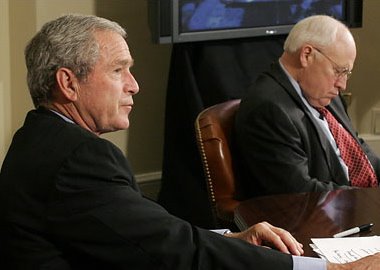There is something really important happening in the world. It's not just that Hezbollah and Israel are at each other's throats, it's not just that the US has destabilized the region and upped the ante. It's that there are two main branches of Islam, the Sunni and the Shi'a, and they are ready to fight to the death.
All of your preconceptions about the conflict in the Muslim world, which states are nice and/or democratic versus which states are mean and/or "rogue", forget them. This battle is going to come down based on who believes what.
If you're having trouble getting your brain around this, think about the Catholics and the Protestants. While both religions follow Jesus Christ, they differ significantly about how to follow Him. To over-simplify it (oh, don't worry, I'll be over-simplifying the Muslims too), the Catholics believe that Jesus chose the disciple Peter as his successor, and Peter formed the Church and became the first Bishop of Rome, a position which later became known as the Pope. That makes the Pope the direct "descendant" of Peter, who got his marching orders directly from Jesus, which makes him the Supreme Head of the Church. Conversely, the Protestants think that Jesus didn't pick a clear successor (there were other Bishops of other cities at that time who were not considered any more important than Peter) because His whole point was that your relationship with God is personal and you don't need anyone in between you and God. This is known as the "priesthood of the believer", which means that if you believe, you are a priest yourself, and you don't need any intercession of priest or even prayers to saints.
Well, that sounds like a pretty academic argument, but if you know anything about European history, you know it has been the cause of much strife and death. And the beautiful, ethereal Ireland became the main front in a war of ideas in modern history. The Irish have more in common with each other than with any other people on the planet, and yet they were killing each other during the Troubles as if Catholics Were From Mars and Protestants Were From Venus.
The Sunni/Shi'a division is very similar. Muhammed (Peace Be Upon Him) also did not leave a clear successor, which left his followers at a bit of a loss as to how to proceed after his death in 632.
Mohammed was a merchant who often went to caves near Mecca to pray. "Muslims believe that in 610, at about the age of forty, while in a cave in the mountain called Hira, he was visited by the Angel Gabriel, who commanded him to recite the verses sent by God. These verses were later collected as part of the Qur'an (which was revealed to him over a period of about twenty-three years until his death)." [Wikipedia]
He went on a preaching mission, similar to Jesus, reinforcing monotheism and warning of Judgement Day, similar to John the Baptist. "He did not completely reject Judaism and Christianity, two other monotheistic faiths known to the Arabs, but said that he had been sent by God in order to complete and perfect those teachings." [Wikipedia] Remember, ultimately the God of Judaism and the God of Christianity and the God of Islam are all the same entity, the religions having already branched off (twice) many centuries before.
He moved the people of his time to reinvigorate their relationship with God, and as the quote above said, to "perfect" it. Consequently, his death left a large vacuum. If Muhammad was the only one who understood what was to be done and how to perfect religion, then who would direct the people now? "Two questions faced these early Muslims: who was to succeed Muhammad, and what sort of authority he was to exercise." [Wikipedia] Jesus left a similar vacuum-- He told us that there was a better way, but He was gone after three years, leaving mere mortals to figure out what the heck He was talking about.
What we would call the "disciples" of Muhammad are called "caliphs" in Islam. Mohammed had plenty of these. Traditionally, according to Wikipedia, Arabic leaders were chosen to lead by a committee called the "caliphate" (think of Jesus' disciples, only more of them). If a familial heir was competent, great, but if not, the caliphate was free to choose someone else that would do a better job. (Apparently there was no official method to do this.)
Muhammad had two potential successors--
-- Abu Bakr who was M's lieutenant and right-hand man (think St. Peter) and
-- Alī ibn Abī Talib, who was his son-in-law.
The followers of Abu, the lieutenant, became the Sunni.
The followers of Ali, the son-in-law, became the Shi'a.
(I hope it's not rude to shorten their names like that, but it will help readers follow all of this.)
The Sunni refer to themselves as followers of the "sunna" or the TEACHINGS of Mohammed. Their leaders are called Caliphs.
The Shi'a refer to themselves as followers of the "Ahlul Bayt", or the FAMILY of Mohammed. Their leaders are called Imams.
They not only don't agree, but these days they really don't get along at all, ala the Catholics and the Protestants in Ireland.
In Part II, we'll look at what effect this split is having on today's politics.
Friday, July 21, 2006
All Hell is Breaking Loose
Posted by
LMP
at
4:22 PM
![]()
Labels: *LMP's Choice Essays, Sunni/Shi'a conflict
Subscribe to:
Post Comments (Atom)






No comments:
Post a Comment